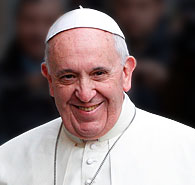Pope Francis Gives Families Food for Thought
Pope Francis is making it clear in these early days of his pontificate that he draws inspiration from St. Francis of Assisi and hopes the rest of us will too.
For the new pope, St. Francis is “the man of poverty, the man of peace, the man who loves and protects creation.” Speaking to members of the communications media March 16, three days after his election, Pope Francis recalled his thoughts at the moment he realized he’d been chosen as pope.
He was seated next to a friend, Brazilian Cardinal Claudio Hummes, who hugged him and said, “Don’t forget the poor.” Pope Francis told the communicators that “those words came to me: the poor, the poor. Then right away I thought of St. Francis of Assisi. Then I thought of all the wars. … Francis is also the man of peace.”
In the days that followed, the world learned that the new pope’s description of St. Francis as a protector was not a casual reference. For Pope Francis, each of us has the vocation to be a protector.
He spelled out this vocation’s meaning during the March 19 Mass in St. Peter’s Square formally marking his papacy’s start. I suspect that husbands, wives, parents, grandparents and others will find food for thought in what the pope said.
At this moment, with a newborn grandchild in our family, I cannot help remarking day by day how vigorously protective his parents are. They are, though, dynamic and nurturing protectors, ultimately dedicated to their child’s growth and development as a person.
The vocation of a protector as Pope Francis intends it applies in so many ways to the demands of family life and caring relationships among family members.
In his words, this vocation brings “the warmth of hope” into our world; it opens up “a horizon of hope.”
Vocation of a Protector
Pope Francis celebrated the inaugural Mass of his pontificate on the feast of St. Joseph. It was from this second saint — his roles in the Holy Family and his surrounding world — that the pope drew unique inspiration that day.
To care for others and the world around us in the way St. Joseph did and true protectors do, Pope Francis proposed that we need “a certain tenderness.”
He asked the huge crowd gathered in St. Peter’s Square and the surrounding streets for the Mass not to forget “that hatred, envy and pride defile our lives.” He said, “Being protectors … means keeping watch over our emotions,” which are the seat of “intentions that build up and tear down.” Immediately he added:
“We must not be afraid of goodness or even tenderness!”
Furthermore, Pope Francis hoped no one would imagine that goodness and tenderness are weaknesses. He explained:
“In the Gospels, St. Joseph appears as a strong and courageous man, a working man, yet in his heart we see great tenderness, which is not the virtue of the weak but rather a sign of strength of spirit and a capacity for concern, for compassion, for genuine openness to others, for love.”
Joseph exercised his role as protector “discreetly, humbly and silently, but with an unfailing presence and utter fidelity,” even when he found “it hard to understand,” Pope Francis said.
He noted how Joseph was “there at every moment with loving care” – from the “time of his betrothal to Mary until the finding of the 12-year-old Jesus in the temple of Jerusalem. As the spouse of Mary, he is at her side in good times and bad.”
Also, Pope Francis commented, Joseph is “all the more sensitive to the persons entrusted to his safekeeping” because “he is able to hear God’s voice and be guided by his will.” The result is that Joseph “can look at things realistically, he is in touch with his surroundings, he can make truly wise decisions.”
Power, Service and Care
Turning attention in his inaugural homily to St. Francis, Pope Francis told his listeners that “the vocation of being a protector” means “respecting each of God’s creatures and respecting the environment in which we live.”
This vocation “means protecting people, showing loving concern for each and every person, especially children, the elderly, those in need, who are often the last we think about.”
What else does this vocation imply? Pope Francis said:
“It means caring for one another in our families. Husbands and wives first protect one another, and then, as parents, they care for their children, and children themselves, in time, protect their parents. It means building sincere friendships in which we protect one another in trust, respect and goodness. In the end, everything has been entrusted to our protection, and all of us are responsible for it.”
Moreover, to the extent that one’s role in life encompasses the exercise of power of some kind, it is vital that this power be defined as service, Pope Francis said. He applied this notion of power directly to himself.
“Let us never forget that authentic power is service and that the pope, too, when exercising power must enter more fully into that service which has its radiant culmination on the cross,” he said.
Like Joseph, he continued, the pope “must open his arms to protect all of God’s people and embrace with tender affection the whole of humanity, especially the poorest, the weakest, the least important.”





